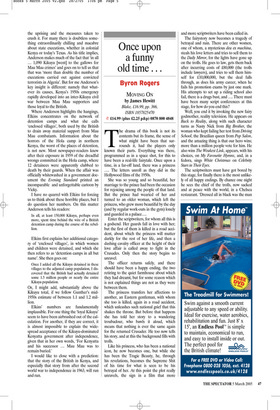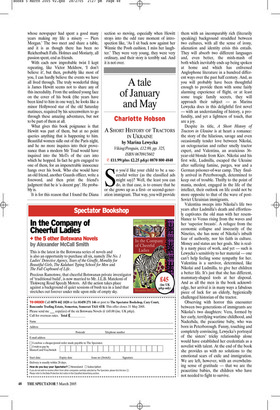Once upon a funny old time . . .
Byron Rogers
MOVING ON by James Hewitt Blake, £16.99, pp. 366, ISBN 1857825470 ✆ £14.99 (plus £2.25 p&p) 0870 800 4848 The drama of this book is not its contents but its frame, the sense of what might have been that surrounds it, had the players only known their parts. Everything was there, programmed as in a space shot, for this to have been a real-life fairytale. Once upon a time, in a far-off land, there was a princess .... The letters unroll as they did in the Hollywood films of the 1950s.
She was so young and so beautiful, her marriage to the prince had been the occasion for rejoicing among the people of that land. But the prince had wearied of her and turned to an older woman, which left the princess, who grew more beautiful by the day (and by regular work-outs in the gym) lonely and guarded in a palace....
Enter the scriptwriters, for whom all this is a godsend. Her guards fall in love with her; but the first of them is killed in a road accident, about which the princess will mutter darkly for the rest of her life, and then a dashing cavalry officer at the height of their love affair is called away to fight in the Crusades. Only then the story begins to unravel.
The officer returns safely, and there should have been a happy ending, the two retiring to the quiet farmhouse about which they had dreamt, but for some reason which is not explained things are not as they were between them.
The princess transfers her affections to another, an Eastern gentleman, with whom she too is killed, again in a road accident, which unleashes such national grief that this shakes the throne. But before that happens she has told her story to a wandering troubadour, who bawls it aloud, which means that nothing is ever the same again for the returned Crusader. He too now tells his story, and at this the background fills with trolls.
Like his princess, who has been a national icon, he now becomes one, but while she has been the Tragic Beauty, he, through his revelations, becomes the Supreme Shit of his time for what is seen to be his betrayal of her. At this point the plot really unravels, the sign in a film that more and more scriptwriters have been called in.
The fairystory now becomes a tragedy of betrayal and ruin. There are other women, one of whom, a mysterious dea ex machina, steals his love letters and tries to sell them to the Daily Mirror, for the lights have gone up on the trolls. He goes to law, gets them back after incurring costs of £80,000 (the trolls include lawyers), and tries to sell them himself for £10,000,000, but the deal falls through, as does his army career, when he fails his promotion exams by just one mark. His attempts to set up a riding school also fail, there is a drugs bust, and .... There must have been many script conferences at this stage, for how do you end this?
Well, you end it by invoking the new fairy godmother, reality television. He appears on Back to Reality, along with such character turns as Nasty Nick from Big Brother, the woman who kept failing her test from Driving School, the Brazilian queen from Pop Salon, and the amazing thing is that our hero wins; more than a million people vote for him. He also wins The Weakest Link, appears, with his choices, on My Favourite Hymns, and, in a fedora, sings White Christmas on Celebrity Stars in Their Eyes.
The scriptwriters must have got bored by this stage, for finally there is the most unlikely of all happy endings. By chance one night he sees the chief of the trolls, now sacked and at peace with the world, in a Chelsea restaurant. ‘Dressed all in black was the man whose newspaper had spent a good many years making my life a misery — Piers Morgan.’ The two meet and share a table, and it is as though there has been no Reichenbach Falls. Holmes and Moriarty, all passion spent, end as friends.
With each new improbable twist I kept repeating, like Victor Meldrew, ‘I don’t believe it’, but then, probably like most of you, I can hardly believe the events we have all lived through. The truly wonderful thing is James Hewitt seems not to share any of this incredulity. From the unlined young face on the cover of his book (the years have been kind to him in one way), he looks like a minor Hollywood star of the old Saturday matinees, required by his screenwriters to go through these amazing adventures, but not to be part of them at all.
What gives this book poignance is that Hewitt was part of them, but at no point queries anything that is happening to him. Beautiful women sidle out of the Paris night, and he no more inquires into their provenance than a modern Mr Toad would have inquired into the MoTs of the cars into which he hopped. In fact he gets engaged to one of them, for an impenetrable innocence hangs over his book. Who else would have an old friend, another Guards officer, write a foreword, and then print the friend’s judgment that he is ‘a decent guy’. He probably is.
It is for this reason that I found the Diana section so moving, especially when Hewitt strays into the odd rare moment of introspection like, ‘As I sit back now against her Winnie the Pooh cushion, I miss her laughter.’ They were very young, they were very ordinary, and their story is terribly sad. And it is not over.



























































 Previous page
Previous page